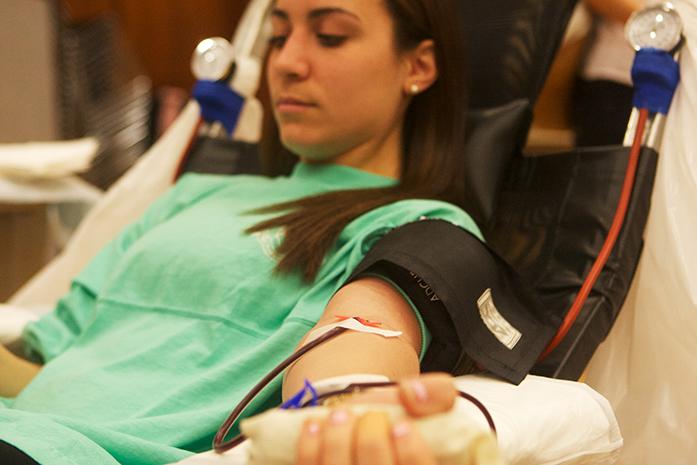By Zach Weigel
zachary-weigel@uiowa.edu
Summers in Iowa City tend to be slower all around while many students flee for a short reprieve elsewhere, and some local clinics are well-prepared for the predicted drop in business.
Both blood banks and plasma clinics in the Iowa City area have forecast the significant drop in their number of clients, and they are working to make up for the summer struggle.
“Overall, donations tend to drop in the summer,” UI Hospitals and Clinics Donor Recruitment Coordinator Kerry Dubay said, noting that to combat the issue stepping up recruitment is a big priority.
Dubay said that during the school year, two-thirds of blood drives are hosted by UI student organizations. Many of these student groups suspend their operation in the summer, meaning an enormous chunk of potential blood donations can’t be counted on.
“We rely more on the community and faculty,” Dubay said.
“Summer promos” are instrumental in ramping up blood donations, she said. Right now, every successful donor gets a tumbler or a T-shirt.
Despite using incentives, Dubay notes that donating blood is incredibly important, especially blood platelets. The platelets have to be transfused within five days, she said, so keeping a constant flow of donors through the door is extremely important.
This means some blood supplies are always needed and can’t be built up in advance.
Sponsoring blood drives throughout summer orientations, in which new students get acquainted with campus are one way Dubay and the UIHC keep up blood supplies in the summer. Current UI students and community members can donate as well.
Plasma clinics such as Biotest Plasma Center also see a shrink in traffic during the summer.
“About half of our donors are of college age, and most are enrolled at either the UI or Kirkwood Community College,” said Biotest Iowa City Center Manager Dan Rohwer.
Unlike blood banks, Biotest is able to pay donors for donating their plasma because it is used to make medicines. That helps keep business up.
Plasma, the liquid portion of blood, is used in a variety of ways, such as helping those with impaired immune systems, restoring blood volume, and assisting in blood clotting for people with hemophilia.
“Plasma therapies are also used as a prophylactic [preventative] treatment of diseases like rabies, tetanus, hepatitis B, and more,” Rohwer said.
There are positives to the summer even though the number of donors drops by approximately 20 percent, he said.
“About 40 percent of the Biotest staff in Iowa City are part-time students, so when the summer hits, we usually have a few that go home for the summer, take vacations, or study abroad,” Rohwer said. “We also use the summer months to cross-train our staff so they can be utilized in other areas and have special projects they do that we can’t complete during the busy months.”
UI senior Jacob Langreck sees the summer as equally good because the donation process is much quicker.
“It typically takes an hour and a half to two hours instead of two to three like during the school year,” he said.



